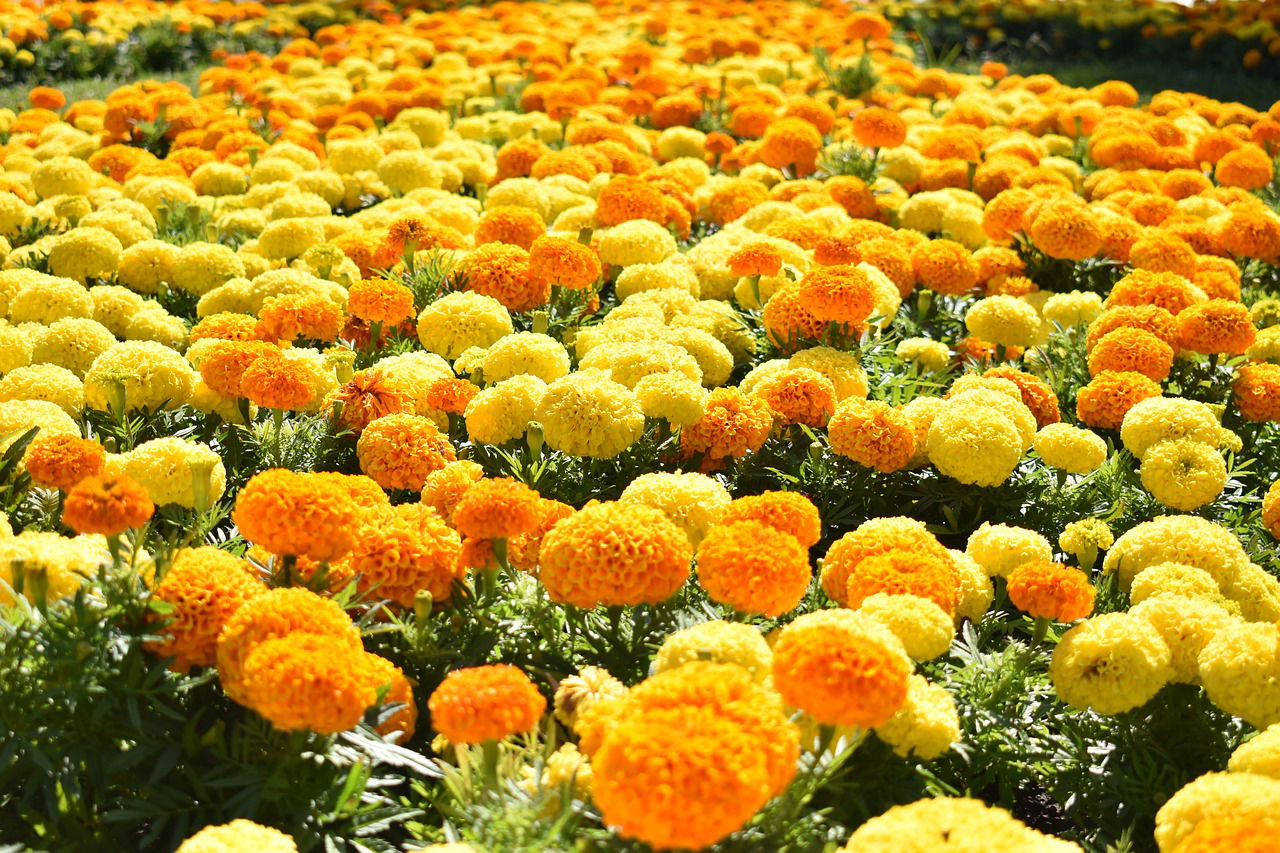
Marigold (Tagetes spp.) is a bright and versatile flower known for its striking orange, yellow, and red blooms. Easy to grow and widely admired for its beauty, marigolds are cultivated for various purposes, including gardens, landscaping, and use as cut flowers. Originally native to Mexico and Central America, marigolds have gained global popularity due to their adaptability, pest-resistant qualities, and minimal care needs.
Importance of Marigold Flowers
-
Agricultural Use: Marigolds play a significant role in organic farming as they naturally repel harmful pests, making them beneficial for sustainable agriculture.
-
Economic Value: Marigolds are in high demand, particularly during festivals like Navratri and weddings, where they are used for decorations and religious offerings.
-
Medicinal Benefits: Extracts from marigold flowers are used in traditional remedies to treat skin conditions and contain antioxidants that provide health benefits.
-
Cosmetic and Dye Industry: Marigolds are also valuable in the cosmetic industry and for producing natural dyes, further increasing their market value.
Cultivation Process of Marigold
-
Soil: Well-drained loamy soil with a pH between 7.0 and 7.5 is ideal for marigold cultivation. Saline and acidic soils should be avoided.
-
Seeds and Sowing: Marigold seeds can be sown year-round. Nurseries are prepared using 1.5 kg of seeds per hectare, and seedlings are transplanted after four weeks. The plants should be spaced 45 x 35 cm apart, with seeds treated with Azospirillum (200 g in 50 ml of rice gruel) before sowing.
-
Irrigation: Plants should be irrigated once a week or as necessary, while ensuring no water stagnation.
-
Fertilization: During the final ploughing, 25 tons per hectare of farmyard manure (FYM) is incorporated and 45:90:75 kg NPK/ha is applied as a base with an additional 45 kg N/ha 45 days after planting.
-
Nipping/Tipping: To promote branching, the terminal portion of the plant should be removed 30 days after transplanting.
-
Crop Duration and Harvest: The marigold crop takes about 130-150 days to mature. Flowers are picked every three days, starting 60 days after transplanting.
-
Yield and Varieties: On average, marigold yields about 18 tons per hectare. Some popular varieties include local orange and yellow types, as well as Pusa Narangi Gainda, Pusa Basanthi Gainda (IARI varieties), and MDU 1.
Plant Protection
Pests:
-
Mealy Bug: These pests gather on young shoots, stems, and leaves, secreting a honey-like substance that causes leaves to turn black. Use prophenophos or dimethoate (2 ml/litre) or Fish Oil Rosin Soap (25 g/litre) to control the infestation.
-
Thrips (Thrips tabaci): Thrips cause discoloration and deformation in plant tissues. Yellow sticky traps (20 per acre) or the release of Amphelicies cucumeris spider parasitoids can help control thrips. Spray Kelthane (1 ml/litre) to manage the infestation.
Diseases:
-
Leaf Spot: Spraying Bavistin (1 g/litre of water) controls leaf spot.
-
Root Rot: Drenching Bavistin (1 g/litre of water) helps prevent root rot.
Market Price of Marigold Flowers
Marigold prices fluctuate based on location, demand, and season. During peak times like Navratri, Diwali, and weddings, marigold flowers can sell for Rs. 20 to Rs. 100 per kilogram in India. Prices depend on the variety, quality, and size of the flowers, with transportation costs and local market conditions also influencing final rates.
(Source: Tamil Nadu Agricultural University, Online Commodity Prices)
















